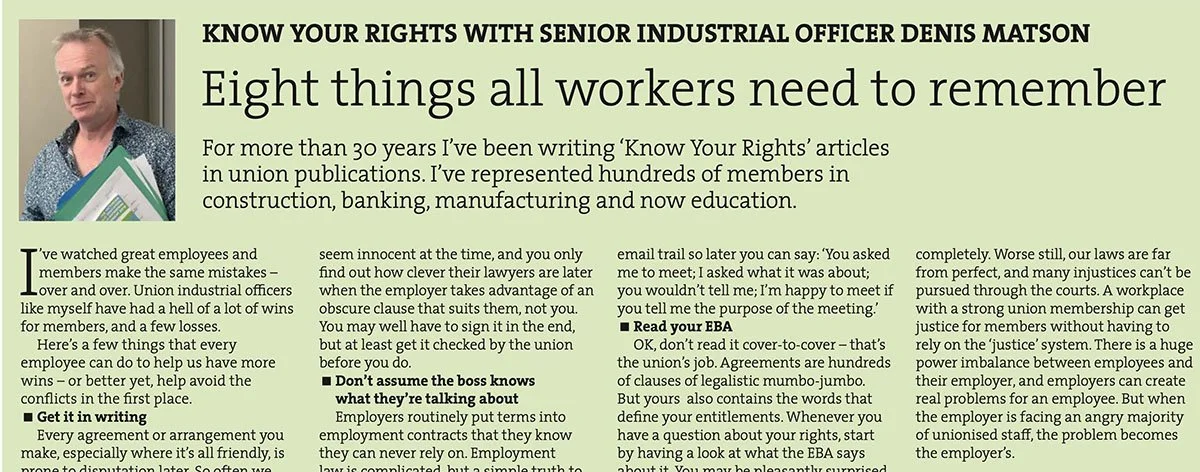From The Point: The 8 things every worker needs to know
KNOW YOUR RIGHTS
SENIOR INDUSTRIAL OFFICER DENIS MATSON
Eight things all workers need to remember
For more than 30 years I’ve been writing “Know Your Rights” articles in union publications. I’ve represented hundreds of members in construction, banking, manufacturing and now education. I’ve watched great employees and members make the same mistakes – over and over. Union industrial officers like myself have had a hell of a lot of wins for members, and a few losses.
Here’s a few things that every employee can do to help us have more wins – or better yet, help avoid the conflicts in the first place.
· Get it in writing
Every agreement or arrangement you make, especially where it’s all friendly, is prone to disputation later. So often we hear, “the previous Principal agreed, but the new one ...” That part-time fraction, the return from leave, the extra allowance, the travel arrangement – they all need to be recorded. If you can’t get the employer to write it down, send them an email with your understanding of the details (and, as per my next point, keep a copy!).
· Take copies of anything you might need
The first thing an employer does when you are in dispute is to lock you out of school emails and files. Keep a copy of every email, contract, and letter relating to your employment. You never know when you may need it.
· Don’t sign that thing!
A member who signs a document relating to their employment without checking with the union is certifiably mad. New contract? Variation of hours? New policy? Every employer has their lawyers draft these documents in a totally one-sided way. All these documents can seem innocent at the time, and you only find out how clever their lawyers are later when the employer takes advantage of an obscure clause that suits the employer, not you. You may well have to sign it in the end, but at least get it checked by the union before you do.
· Don’t assume the boss knows what they’re talking about
Employers routinely put terms into employment contracts that they know they can never rely on. Employment law is complicated, but a simple truth to remember is that Enterprise Agreements, Awards, and the Fair Work Act (among other legislation) over-ride any written or verbal contract. Employees regularly get conned, agreeing to things “because they are in the contract” or “because I agreed to it” when the law says otherwise. Before you assume that the employer has a right to do this thing (whatever it is), check with your Union.
· The ambush meeting
“Can you just pop into my office for a moment?” That question is the start of most workplace disputes. Alwaysask what the meeting is about and, if it relates to your employment, insist on having a representative or support person in attendance. If the employer won’t tell you what it’s about, don’t go. Employees need only follow directions that are “lawful and reasonable”. It is unreasonable to insist that you attend a meeting if the employer will not tell you its purpose. If you have any doubts about the meeting, start an email trail so later you can say: “You asked me to meet; I asked what it was about; you wouldn’t tell me; I’m happy to meet if you tell me the purpose of the meeting.”
· Read your EBA
OK, don’t read it cover-to-cover – that’s the union’s job. Agreements are hundreds ofclauses of legalistic mumbo-jumbo. But yours also contains the words that define your entitlements. Whenever you have a question about your rights, start by having a look at what the EBA says about it. You may be pleasantly surprised – the union negotiates every clause in those documents to get members the best possible conditions. And don’t assume that the EBA is the end of the matter – it’s just a good start. Once you’ve checked what the EBA has to say, check with the union for the rest of the story.
· Keep your membership current
The IEU has a policy which prevents it from acting for people who join with a pre-existing issue, or are not paying in the correct fee category. It’s like insurance – you can’t wait until you’ve had an accident to take out the policy. Some members who have been unemployed or working few hours forget to update their membership when they get more employment. That makes them “unfinancial” and ineligible to be represented.
· Recruit your colleagues
The law provides certain protections, but the justice system can be slow and expensive and sometimes it fails completely. Worse still, our laws are far from perfect, and many injustices can’t be pursued through the courts. A workplace with a strong union membership can get justice for members without having to rely on the “justice” system. There is a huge power imbalance between employees and their employer, and employers can create real problems for an employee. But when the employer is facing an angry majority of unionised staff, the problem becomes the employer’s.
Other top tips for education staff:
· Don’t use your own car for work purposes
· Your union representative can be more than a ‘support person’
· Be VERY careful in your interactions with students: If you have any private, personal, or “confidential” interactions, let your principal know. If you are apprehensive about telling the principal, then you shouldn’t be doing it.
· Don’t wear work-related costs. The employer must pay for equipment and services you need for work: computers, work phones, hiring academic gowns for the graduation, costs for attending PD, etc.
· If an employer “policy” prevents you from exercising a right (such as to take accrued Long Service Leave) the policy is probably unlawful.

